Introduction: A Tale of Two Israels
In the span of a single century, Western Christian consciousness underwent a radical shift. Once, millions in Britain and America believed that their own nations were the true heirs of biblical Israel—a view known as British-Israelism. By the mid-20th century, however, support for the modern state of Israel became the dominant theme of evangelical Christianity, with biblical prophecy interpreted to demand unwavering political and financial backing of the Jewish nation in Palestine.
This transformation was not a mere organic evolution of ideas, but the result of a carefully orchestrated convergence of theological innovation, elite financial power, and geopolitical strategy—embodied in the publishing of the Scofield Reference Bible and the ascendance of modern Zionism, both with deep connections to the Rockefeller dynasty and international banking interests.
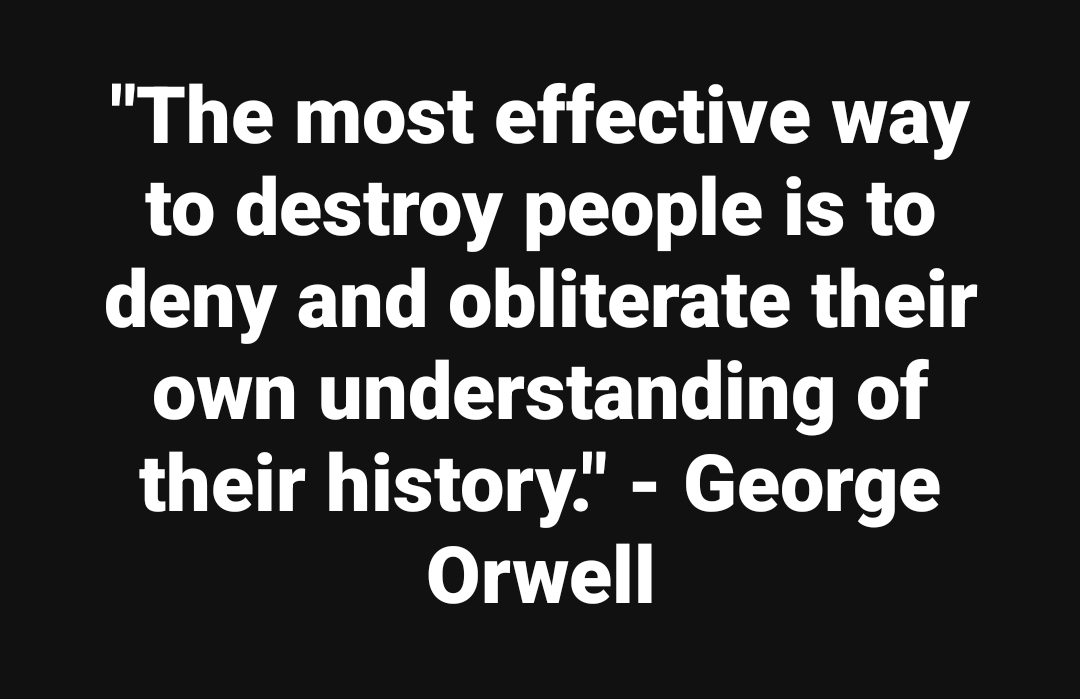
The British-Israel Movement: Roots, Theology, and Decline
1. Origins and Core Claims
- British-Israelism (Anglo-Israelism) took shape in the 19th century, as theologians and laymen in Britain and its colonies claimed that the Anglo-Saxon peoples were descendants of the “lost” tribes of Israel, exiled after the Assyrian conquest.
- They interpreted biblical prophecies—regarding Israel’s restoration, global influence, and royal lineage—as being fulfilled in the British monarchy and Empire.
- Literary works like Israel in Britain (Colonel Garnier) and The Book of Tephi (Goodchild, Crookes) provided genealogical, linguistic, and legendary “proofs” for this claim.
2. The Nationalist Theological Framework
- This theory elevated the British Empire and later the United States as instruments of God’s will, destined to lead the world in justice, order, and “Christian civilization.”
- The “throne of David,” Sabbath-keeping, common law, and the spread of the English language were presented as fulfillments of ancient prophecies.
- Though mostly Protestant, this movement combined fervent nationalism with a literalist approach to the Bible.
3. Decline and Critique
- By the early 20th century, British-Israelism faced critique from mainstream historians, theologians, and scientists for its lack of real genealogical or archaeological support.
- As Britain’s global power waned after World War II, the movement’s relevance and appeal diminished, especially in the face of newer, more urgent interpretations of prophecy.
The Rise of Modern Zionism and the Scofield Bible
1. Modern Zionism Emerges
- While British-Israelism looked west for Israel’s “restoration,” Zionism—founded by Theodor Herzl and others in the late 19th century—looked east, to Palestine.
- Zionism was a secular political project to establish a Jewish homeland, gaining steam through European diplomacy, the Balfour Declaration (1917), and growing support from international financiers including the Rothschild and (later) Rockefeller networks.
2. The Scofield Reference Bible: Theology by Footnote
- In 1909, the Scofield Reference Bible was published by Oxford University Press. Cyrus I. Scofield, a relatively obscure American preacher, was recruited and funded by a network of elite financiers, with ties to the Rockefellers and the wider banking world.
- What made the Scofield Bible revolutionary was not its translation, but its footnotes: Scofield introduced dispensationalism, a new system that divided biblical history into distinct eras (“dispensations”).
- Central to Scofield’s system was the teaching that God’s promises to Israel were eternal and unconditional, that prophecy required the literal restoration of Jews to Palestine, and that Christians should support this restoration as a matter of faith.
- Scofield’s Bible became the most popular study Bible in American evangelicalism, shaping generations of pastors, preachers, and lay Christians.
3. The Role of Rockefeller and Allied Power
- The Rockefeller family, known for their vast fortune and global influence, played a significant role in shaping 20th-century Protestantism.
- Through foundations, publishing, seminary grants, and control of key religious institutions, Rockefeller money promoted the spread of Scofield’s dispensationalism and suppressed alternative interpretations, including British-Israelism.
- They also heavily funded the ecumenical movement and key Bible colleges, ensuring the new doctrine reached the grassroots of American Christianity.
The Theological Coup: From British Israel to Modern Israel
1. The Eclipsing of British-Israelism
- The Scofield Bible reframed prophecy: rather than being fulfilled in Anglo-Saxon nations, the restoration of Israel would be fulfilled only by the re-establishment of a Jewish state in Palestine.
- British-Israelism, with its focus on the West, gradually faded, supplanted by the new paradigm: Christian Zionism.
- The new doctrine was actively promoted by American evangelicals, who became the most ardent supporters of the modern state of Israel—politically, financially, and theologically.
2. Manufactured Consent and Political Power
- The shift from British-Israelism to Christian Zionism was not just a theological debate—it had enormous geopolitical consequences.
- American foreign policy, especially after 1948, became intertwined with unconditional support for Israel, justified through Scofieldian theology.
- Media, seminaries, and lobbying organizations (AIPAC, CUFI, etc.) all reinforced the narrative, with the original nationalistic and spiritual framework of British-Israelism all but erased.
Underlying Motives: Finance, Power, and Control
1. Elite Interests in Narrative Control
- Rockefeller and allied banking interests saw both political and economic advantage in the creation and support of Israel: a strategic ally in the Middle East, a lever over regional politics, and a focal point for endless “wars on terror” and arms sales.
- By shaping Christian belief through the Scofield Bible, these interests created a powerful constituency for their foreign policy goals—millions of Christians who would lobby, vote, and donate in support of policies crafted in elite boardrooms.
2. The Manufactured Overton Window
- Dissenting voices—those who questioned the new theology or the alliance with the secular Israeli state—were increasingly marginalized.
- What had once been a robust debate over the “true Israel” was narrowed to one acceptable answer, enforced by both religious and secular authorities.
Consequences and Legacy
1. Transformation of Western Christianity
- The shift from British-Israelism to Christian Zionism was perhaps the most significant theological transformation of the modern era. It turned millions of Christians into reflexive supporters of a foreign state, often with little awareness of the recent and engineered origins of their beliefs.
- The doctrine of “blessing Israel” became a litmus test of orthodoxy in many churches, with deep implications for preaching, giving, and political activism.
2. Enduring Impact on Foreign Policy
- The “sacred alliance” between American evangelicals and Israel fundamentally changed U.S. foreign policy, leading to decades of intervention, conflict, and instability in the Middle East.
- The alignment of religious belief, elite power, and geopolitics became a self-reinforcing cycle—one that persists to this day.
3. Lessons for the Future
- The story of how Rockefeller, the Scofield Bible, and modern Zionism supplanted British-Israelism is a warning about the power of money, publishing, and narrative to reshape not only theology, but national destiny.
- It underscores the need for vigilance, critical thinking, and a willingness to question even the most deeply held convictions, especially when they emerge from the nexus of elite interests.
Who Defines Israel?
The question of “Who is Israel?”—once debated in pulpits, pamphlets, and royal courts—was decisively answered in the 20th century, not by new revelation, but by the intersection of power, profit, and publishing. As a result, the spiritual and national identities of millions were redirected, their faith harnessed to projects designed far above their heads.
To understand how this happened is to begin to reclaim agency—over faith, politics, and the stories that shape our lives.
George Washington, the Bible, and the American Founders: New Israel and Fulfilled Prophecy
Swearing-In on the Bible
- During George Washington’s first presidential inauguration (April 30, 1789), he famously placed his hand on a Masonic-owned King James Bible.
- The Bible was opened (reportedly at random) to Genesis 49, which describes Jacob’s blessings on his sons—often interpreted as prophecies about the tribes of Israel.
- Some traditions state that the passage included “the vine” or references to Joseph and the lost tribes, symbolic of a chosen nation’s destiny.
The Founders’ View: America as New Israel
- The American Founders—deeply familiar with the Bible—often viewed the new nation as a kind of “New Israel.”
- They saw themselves as a people delivered from bondage (England), establishing a covenant society on a new promised land.
- Sermons and writings from the Revolutionary era are filled with references to Israel’s exodus, the “vine out of Egypt,” and fulfilling prophecy.
Fulfillment of Prophecy
- Early Americans believed their “errand into the wilderness” was not just political but spiritual—a continuation of the biblical story.
- The language of “chosen people,” “covenant,” “promised land,” and even “city on a hill” (from Jesus’s Sermon on the Mount and the Puritan John Winthrop) all reinforced this narrative.
- Washington and many others believed they were part of a destiny to establish a just, godly, and free society, fulfilling the highest ideals of Israel’s ancient prophets.
The Lost Tribes and the Vine
- The “vine” is a biblical symbol for Israel (see Psalm 80:8, Isaiah 5:1–7).
- Some 18th- and 19th-century thinkers connected the idea of America as “the lost tribes restored”—not in literal bloodline, but in spiritual mission, law, and liberty.
- This symbolism was later picked up by British-Israelism and other movements, but its American roots are evident in founding sermons, poetry, and civic ritual.
Legacy
- This “New Israel” framework helped shape American identity for generations, influencing everything from manifest destiny to abolitionist rhetoric.
- Over time, the narrative shifted (as described in previous articles) toward support for a modern, literal Israel in the Middle East—but the spiritual and prophetic self-understanding at America’s founding was powerful and foundational.
In summary:
The Founders—Washington included—used biblical language and symbolism to frame America’s experiment as a fulfillment of the hopes and promises given to Israel: a nation dedicated to God, law, and liberty, planted like a new vine in a new world.
Timeline: The Symbolism of Israel in American History
1. 1600s–1700s: Early Colonial America
- Puritan “City on a Hill”
(Icon: ship crossing the sea, Bible)
Colonists view themselves as a new Israel escaping Egypt (England) for a promised land.
2. 1776–1789: Founding Era
- Revolutionary War & Founding Fathers
(Icon: Liberty Bell, Washington’s Bible)
Founders use Exodus language: “new chosen people,” “errand into the wilderness.” - Washington’s Inauguration
(Icon: open Bible, vine)
Swears oath on Bible (reportedly Genesis 49)—symbolism of lost tribes, prophecy, “vine out of Egypt.”
3. Early 1800s: The New Republic
- Manifest Destiny
(Icon: covered wagon, rays of light)
Expansionist rhetoric: America as “promised land,” divine mission.
4. Mid–Late 1800s: British-Israelism & American Israel
- British-Israel Movement
(Icon: crown, lion, harp)
Claims of British/American fulfillment of lost tribes’ destiny, royal lineage, prophecy. - Civil War & Abolition
(Icon: broken chains, Exodus imagery)
Preachers compare emancipation to Moses freeing Israel.
5. Early 1900s: Theological Shift
- Scofield Bible, Rockefeller Influence
(Icon: Bible with large footnotes, dollar sign, oil lamp)
Dispensationalism and Christian Zionism gain traction; support shifts toward modern political Israel.
6. 1948: Creation of Modern Israel
- State of Israel Founded
(Icon: Israeli flag, globe)
Evangelical and political support for Israel as fulfillment of prophecy.
7. Late 1900s–Present: Christian Zionism Dominates
- Unconditional Support for Israel
(Icon: handshake, Capitol dome, cross + Star of David)
American policy, faith, and identity linked to supporting the modern state of Israel.
Symbols to Include:
- Bible, vine/branches, Liberty Bell, crown, Lion of Judah, American flag, Star of David, dollar sign, arrows/arcs showing shift in narrative.
- Footnote: “Overton Window” shifting from spiritual/national Israel to literal, political Israel.

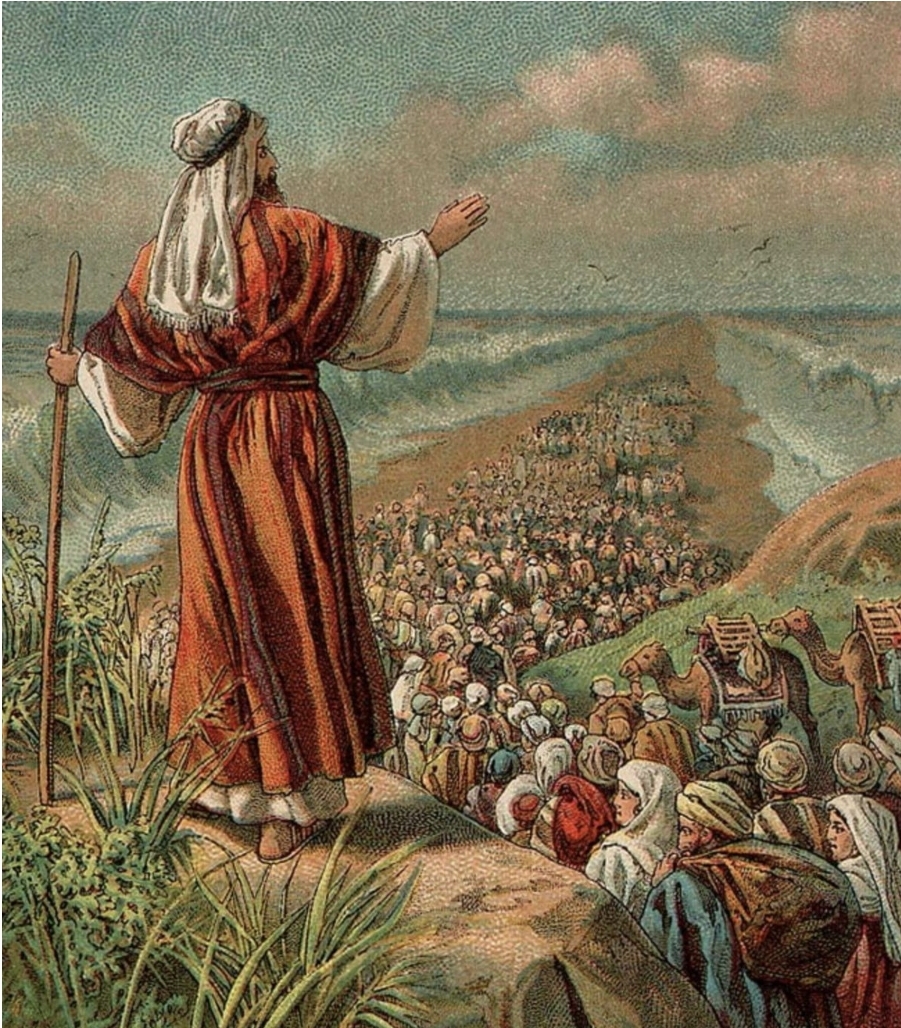


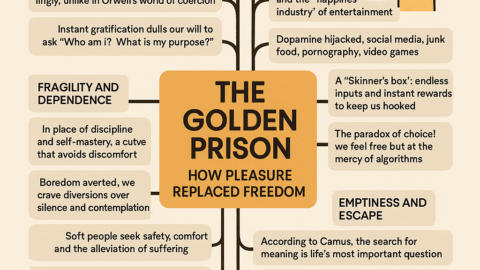
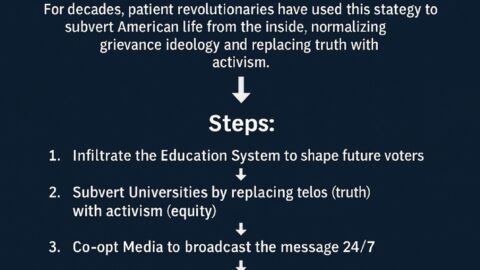
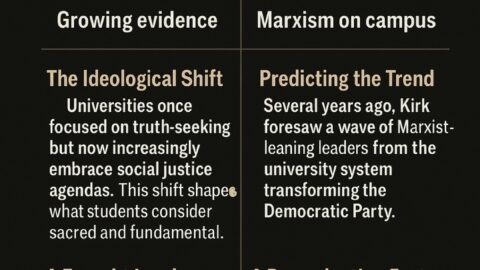
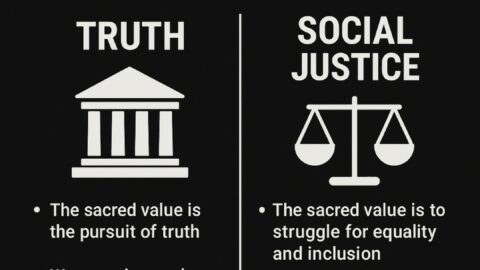
One Response
HERE is a question for you: what would you think of a person who professes to know a certain family very well indeed, but nevertheless always calls the two sons of that family
by the same name, ie., the same Christian name?
And, to add still more confusion, often calls both sons by some other different name altogether! Surely, you would feel like advising that person to sort out his facts!
And yet, most amazingly, many Christians do exactly the same thing, when, in the Bible,
they read of Israel, the House of Israel, the House of Judah, and the Jews; in their thinking speaking, and writing, they mix them all up together and refer to all of them alike as “Jews”.
https://ensignmessage.com/articles/tell-me-please-british-israel-identity-foundation-truths-1/